Anywhere you go in Rafah, it is severely overcrowded. Misery and exhaustion are the most common refrains here in the southernmost city of the Gaza Strip. This is mixed with bitterness at their chronic lack of basic necessities and the world’s silence.
When passing through the crowds, overhearing people’s conversations is easy. Their fears and concerns all reflect the same dread at Israel’s impending invasion of Rafah.
“Where will we go?” This question is the most common, flying in the face of previous hopes that there would be an expected ceasefire following Hamas’s positive response to the Paris ceasefire proposal. Those hopes were dashed when Benjamin Netanyahu resolved to continue the war “to the end,” and it appears the world is content to allow Israel to continue with its genocidal war.
Most of the 1.5 million Palestinians now in Rafah came from somewhere else across the Gaza Strip. Most of them have seen what happens in an Israeli ground invasion, and they can already see the pattern repeating itself over the past four days in Rafah. The first sign of the impending invasion came in the dozens of airstrikes that tore through the city, leading to the death of hundreds of people over the past few days, including children.
But if the same pattern of events continues as it did in the previous ground invasions of northern and central Gaza, the scale of human death in Rafah will make the previous months of extermination pale in comparison.
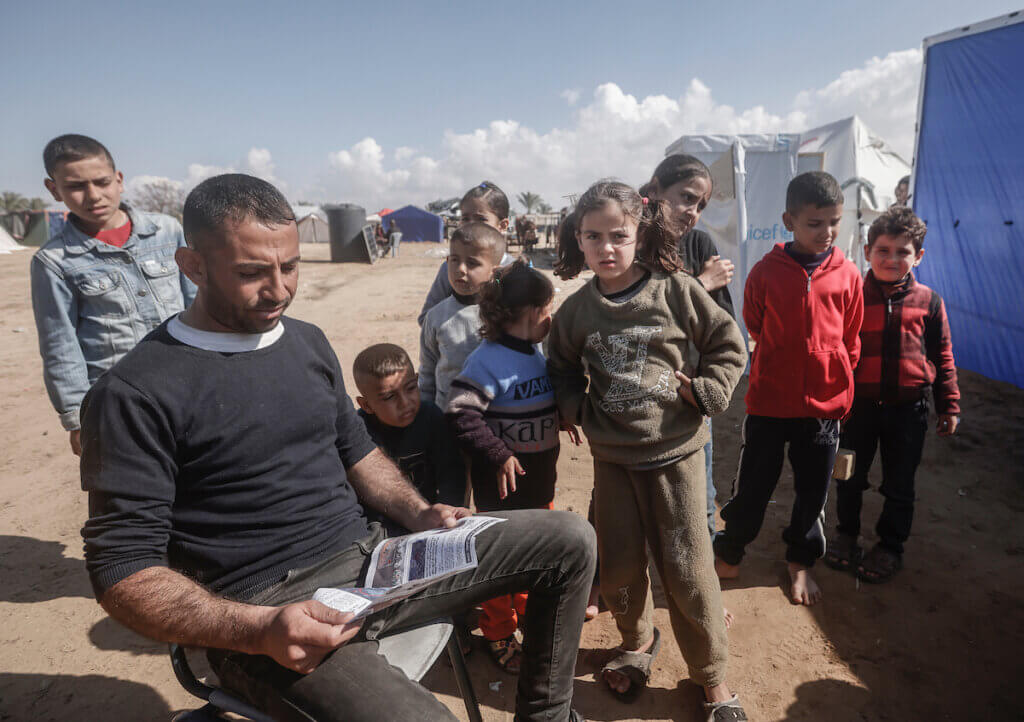
Ibrahim Barda’, a father of six children who fled with his family from Gaza City, is now sheltering at the European Hospital between Khan Younis and Rafah. At the entrance to his tent, he and his wife are trying to start a fire to prepare a meal for their children. The European Hospital has become the only hospital in Khan Younis that Israeli forces have not yet invaded. But it is expected that it, too, will eventually be raided and emptied of patients, refugees, and medical personnel.
Barda’, like the thousands of other refugees occupying a sea of tents in the hospital’s vicinity, expects that the hospital will be overrun in the coming days. He was there for the invasion of Al-Shifa’ Hospital last November, when the Israeli army committed unspeakable horrors.
“I’ve spent the entire war moving from one place to another,” he tells Mondoweiss. “I set up my tent only to take it down again after a short time, leaving my children naked out in the cold until we can find someplace new to seek shelter.”
“The only option we have is to continue to be surrounded by death.”
Ibrahim Barda’
“I have listened to every order from the Israeli army, and we would always go to the latest ‘safe zone’ designated by the army,” he continues. “And now we’re on the edge of Rafah [in Khan Younis], and if the army orders us south into Rafah and then invades, I don’t know where we’ll be able to go next.”
“There is nowhere left to go in Gaza. The only option we have is to continue to be surrounded by death,” he adds.
Barda’ is surrounded by fire. On one side, fierce battles rage on. On the other, airstrikes level neighborhoods, while the Israeli army threatens to do to Rafah what it did to every other city it invaded. People following the news continue to cling to hope, searching for any news that might indicate the possibility that they will be able to return to their homes.
But the army pronouncements are clear, and the indications on the ground are even clearer. They all say that when the army finishes with Khan Younis, it will move on to Rafah.
It will be much easier for the army to surround Rafah from all sides than it has been for Gaza’s other cities. From the north, Rafah borders Khan Younis, where the army continues to operate; from the east, it borders the Israeli fence; from the west, it borders the sea, beyond which Israeli warships await; and from the south, the only side not bordering an area controlled by Israel, it borders Egypt. On this latter side lies the Philadelphia Corridor, the object of Israel’s designs.
In the Philadelphia Corridor, a 14-kilometer strip of land along the Gaza-Egypt border, thousands of people have set up their tents, meaning that an invasion could entail the killing of many of these refugees.
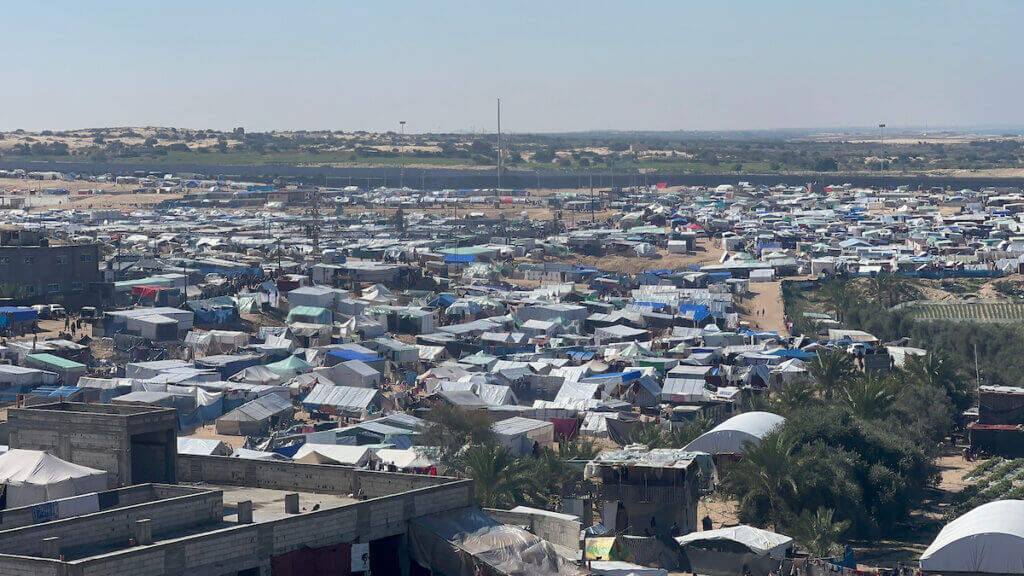
The sea of tents is perched under the watchful eyes of Egyptian guard towers. People strolling along the border fence sometimes call on Egyptian guards to throw over cigarettes. Other people report that officers have occasionally allowed them to use extender cables to provide them with electricity.
On Monday night, Rafah witnessed one of its most intense escalations, punctuated by violent airstrikes that shook the entire city, ripping through housing blocks and human flesh. Initial reports from local journalists estimate that a minimum of 300 people were martyred in that night’s raids alone (150 have been recovered so far, while another 150 remain missing under the rubble). Israel destroyed 16 houses and three mosques during this period.
Already, people are starting to flee back north to the central parts of Gaza, such as the Nuseirat refugee camp or the city of Deir al-Balah, believing that if the army invades Rafah, then the danger everywhere in Gaza is the same, and the illusion of a “safe zone” is over. Better, then, to go back to what remains of our old homes and die there.
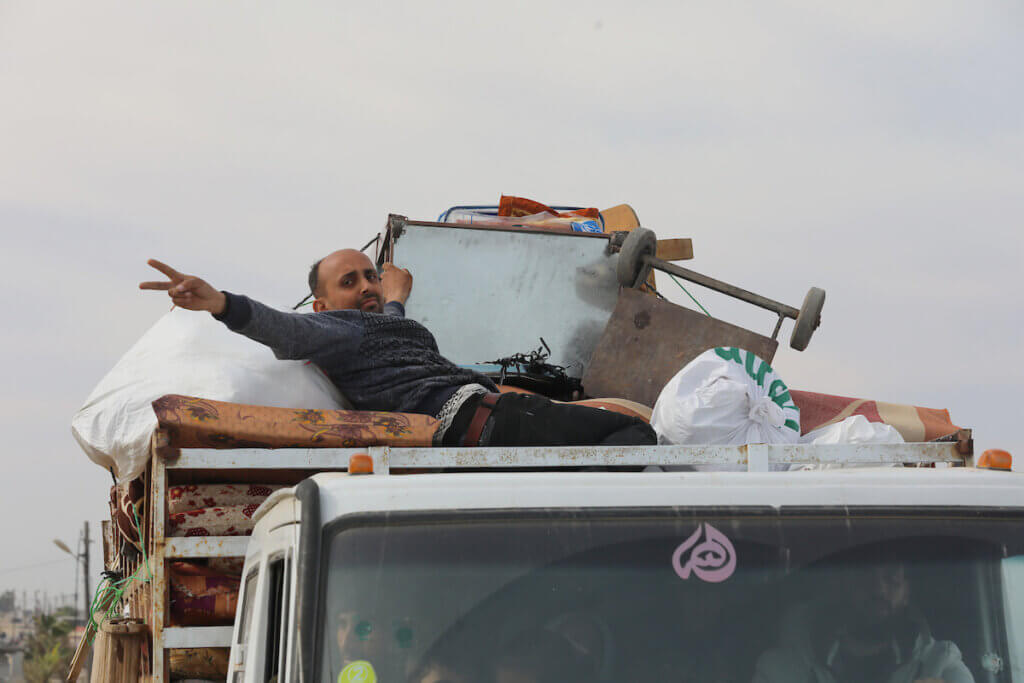
Azmi Abu Shirbi, who set up his tent near the Egyptian border, says that he has no other choice but to remain where he is.
Abu Shirbi, 56, is responsible for a family of nine, including some of his sons and daughters and their children, meaning the total number of people packed into a single tent is 20.
“I have been displaced from one place to another throughout this war,” he tells Mondoweiss. “From Gaza to Nuseirat, from Nuseirat to Khan Younis, and from Khan Younis to Rafah.”
“I came here because I feel that in the end, we will be expelled outside of the Gaza Strip,” he continues somberly. “I am here at the closest point of escape from Israeli fire. If we see or hear that a ground invasion of Rafah has begun, I will take my family and head to the Egyptian fence. That is my only choice.”
He often strolls by the fence and asks the Egyptian soldiers on the other side, what will happen if we breach the fence? Will you open fire on us? The soldiers don’t give a satisfying answer, laughing in his face and then falling silent.
He still thinks this will be the only option — to storm the Egyptian border fence and enter the Sinai.
He isn’t the only one considering this possibility. Walking through Rafah, this is a common topic of conversation, and many people are saying that they will not allow what happened to the people who stayed in Gaza City to happen to them.
All the while, the situation deteriorates in Rafah as the airstrikes intensify, and scores of martyrs emerge from the rubble with severed limbs and disfigured torsos. The indiscriminate carpet bombing tends to start in the middle of the night as everyone sleeps — when it is harder to capture and record what is happening — and continues into the dawn. Then, the army switches to targeted airstrikes (of people and buildings) throughout the rest of the day. But the bombs don’t stop dropping one way or another.
The choices facing the people in Rafah will not be the difference between saving their lives or not. If the army surrounds them, they have nowhere to go. They will be forced to endure the fire and look death in the face.
Tareq S. Hajjaj
Tareq S. Hajjaj is the Mondoweiss Gaza Correspondent and a member of the Palestinian Writers Union. Follow him on Twitter at @Tareqshajjaj.
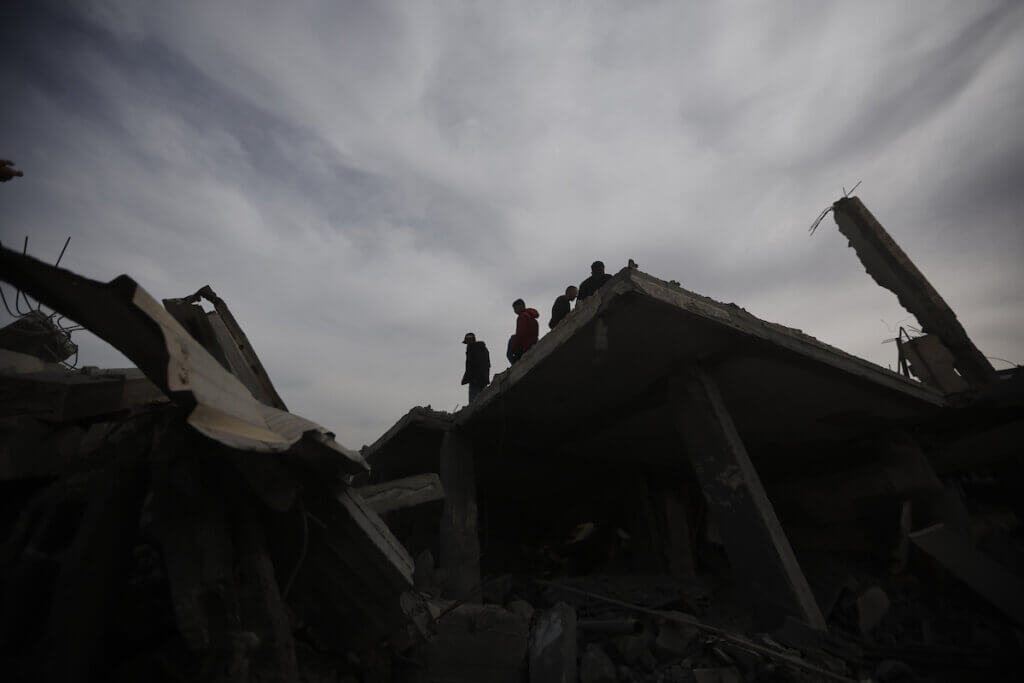
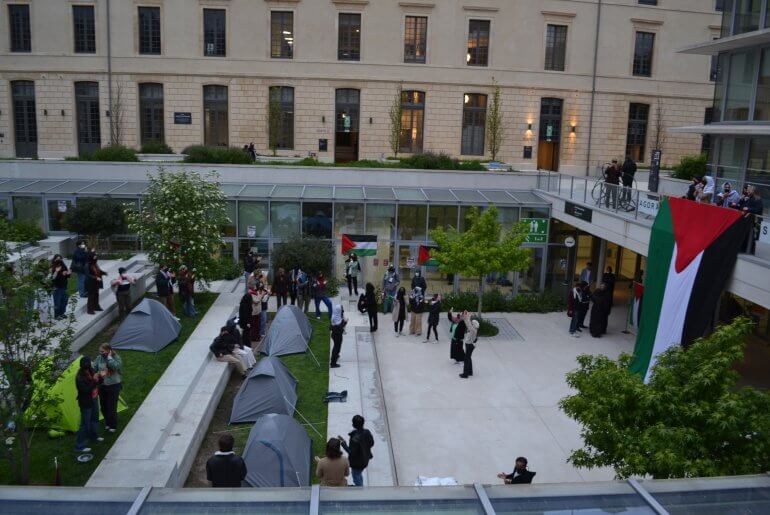
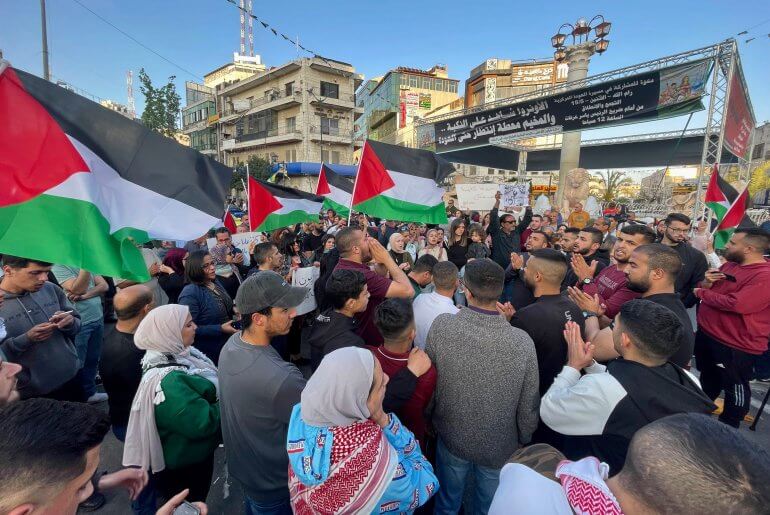
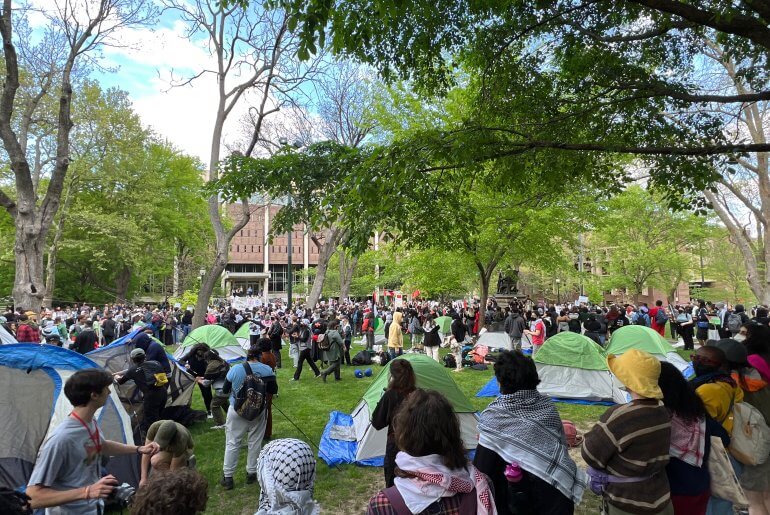
I think the time for protesting in D.C. lobbying P Biden and our Reps to demand pass a call for a ceasefire, etc etc is long over. The time for mass arrest here in U.S. against Israel’s genocide being committed against innocent Palestinians is long overdue!
As Israel continues to slaughter thousands of innocent Palestinians P Biden responds with pathetic platitudes “Israel has gone too far.” Blinken “I care about Palestinian children as much as I care about my own” What utter bullshit.
14 billion more going to Israel to kill more innocent Palestinians. Biden and Blinken. B &B not much different than BB.
Some Americans protesting, writing our Reps, attending meetings, lobbying our own city commissions. Way overdue for mass arrest.
Not a question in my mind Biden will not be re-elected because of this issue. The older human rights activist I am hearing say they will not vote for Biden again, combined with young votes, Muslim’s not being willing to vote for Biden is astounding. Biden has been digging his own defeat.
I think that the General Assembly needs to use its “Uniting For Peace” powers to authorize a coalition of the willing to break the blockade and seige of Gaza and setup a peacekeeping force.
For its own part, South Africa has gone back to the ICJ and requested new provisional measures to prevent the operation and provide humanitarian assistance.
https://x.com/CIJ_ICJ/status/1757474247545332004?s=20
CNN’s Israel bias is the norm, not the exception
The media’s inability to report objectively is linked to longstanding complicity in Israel’s actions.
By Jonathan Cook
February 13, 2024
“Leaks from within CNN reveal that for months its executives have been actively imposing an editorial line designed to reinforce Israel’s framing of events in Gaza, to the point of obscuring atrocities by the Israeli military.
The dictates, say insiders, have resulted in senior staff refusing to accept assignments to the region “because they do not believe they will be free to tell the whole story”. Others suspect they are being kept away by editors who fear they will fight the restrictions.
Internal memos insist that stories be approved by the station’s Jerusalem bureau, where staff are widely seen as partisans who slant reports in Israel’s favour. Palestinian perspectives are tightly restricted.
“Ultimately, CNN’s coverage of the Israel-Gaza war amounts to journalistic malpractice,” one staffer told an investigation by the Guardian newspaper.
According to staff accounts, CNN’s pro-Israel directives come from the very top – Mark Thompson, a TV executive who was hired from the BBC. Thompson, the Guardian article notes, was remembered by BBC staff for “bowing to Israeli government pressure on a number of occasions” – presumably one of the qualifications that won him the job heading CNN.”
https://informationclearinghouse.blog/2024/02/13/cnns-israel-bias-is-the-norm-not-the-exception/12/
The fight against western-financed mass slaughter in Gaza isn’t just a struggle to liberate Palestine but rather a battle for the future of humanity and a battle to liberate us all.
To discuss this and more, Rania Khalek was joined by Matteo Omar Capasso, the Marie Curie Research Fellow at Columbia University and the University of Venice, Italy; author of “Everyday politics in the Libyan Arab Jamahiriya”; and editor of Middle East Critique. His work focuses on the nature and impact of U.S.-led imperialism
This is just part of this episode. The full interview is available for Breakthrough News Members only. Become a member at https://www.gstatic.com/youtube/img/watch/social_media/patreon_1x.png / breakthroughnews to access the full episode and other exclusive content.
https://youtu.be/YK3g491BbLY?si=wuN4jSLeu8pMV-xL&t=4